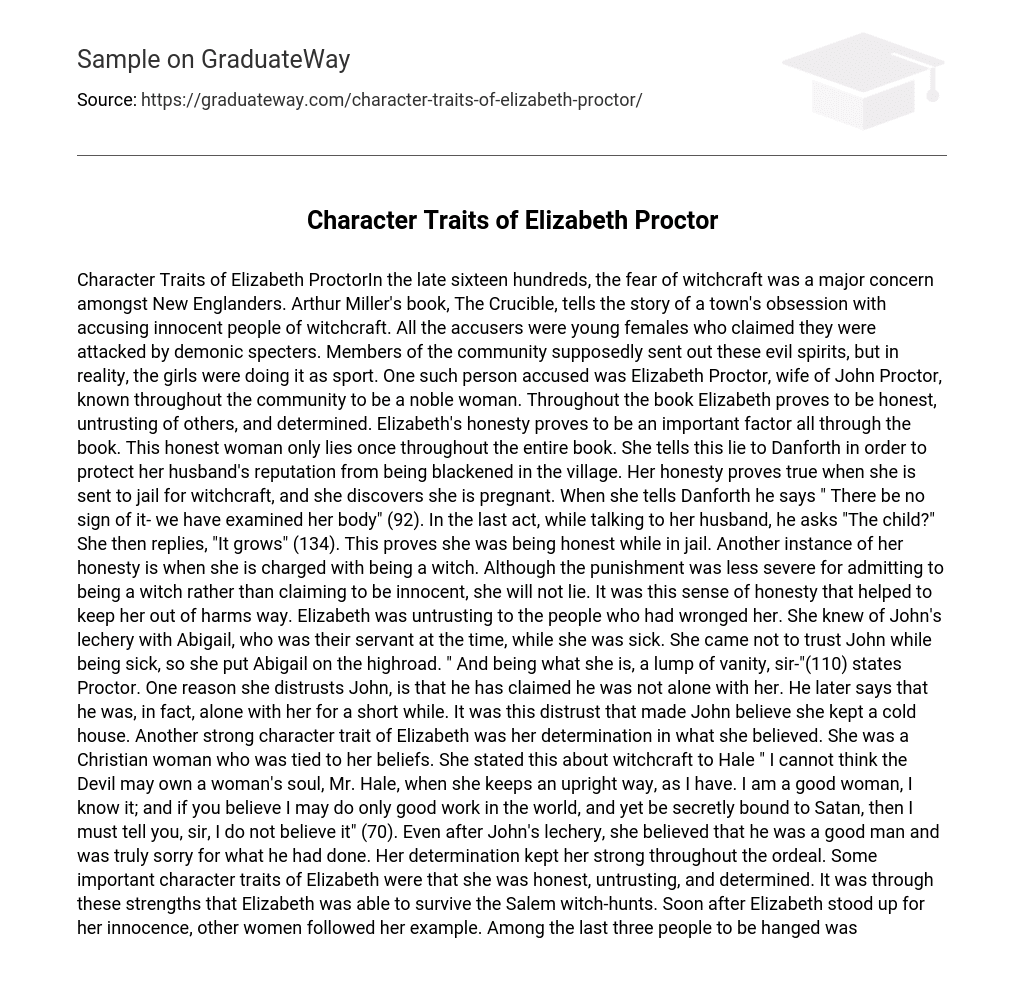Elizabeth Proctor’s character traits in the late sixteen hundreds were shaped by the prevailing fear of witchcraft among New Englanders. The Crucible, a book by Arthur Miller, portrays a town consumed by the hysteria of falsely accusing individuals of practicing witchcraft.
Several young women, who were all alleged victims, claimed to have been assaulted by supernatural apparitions. It was believed that some members of the community were summoning these malevolent spirits. However, in truth, the girls were participating for amusement. Elizabeth Proctor, wife of John Proctor and respected for her integrity within the community, was among those falsely accused. Throughout the story, Elizabeth maintains her loyalty and skepticism towards others while demonstrating unwavering determination. The narrative consistently highlights her honesty as a prominent theme.
In the book, this woman, who is generally known for her honesty, only tells one lie. She fabricates this lie when speaking to Danforth, with the intention of safeguarding her husband’s reputation in the community. Her commitment to honesty becomes evident when she is imprisoned for being involved in witchcraft, and she ultimately reveals that she is expecting a baby. Upon hearing this news, Danforth denies its truthfulness by claiming, “There is no evidence of it – we have thoroughly examined her physically” (92).
In the final act, during a conversation with her husband, he asks about the child. She responds, “It grows” (134). This interaction demonstrates her honesty even while in jail. Another example of her truthfulness is when she is accused of being a witch. Despite the lesser punishment for confessing to being a witch rather than asserting her innocence, she refuses to lie. It is her commitment to honesty that protects her from harm. Elizabeth distrusts those who have harmed her.
During her illness, she discovered that John was engaging in an affair with their servant, Abigail. This caused her to lose trust in John and she decided to dismiss Abigail. Proctor, in an attempt to justify her actions, asserts, “And being what she is, a lump of vanity, sir” (110). One of the reasons for her mistrust towards John is his initial denial of being alone with Abigail, only to later admit that he had indeed been alone with her for a brief period. It was this loss of trust that led John to believe she created a cold atmosphere in their home.
Elizabeth demonstrated strong determination in her beliefs, especially as a devout Christian. When discussing witchcraft with Hale, she expressed her disbelief that a woman who lived a righteous life, such as herself, could have her soul owned by the Devil. She firmly stated, “I am a good woman…I do not believe [that I am secretly bound to Satan]” (70). Despite John’s betrayal, Elizabeth still believed in his inherent goodness and genuine remorse for his actions.
Elizabeth’s determination, honesty, distrust, and determination were crucial in helping her endure the Salem witch-hunts and inspiring other women to defend their innocence. Sadly, her husband was among the last three individuals to be hanged after confessing to witchcraft.
Refusing to sign the confession, he aimed to protect his family’s reputation.





